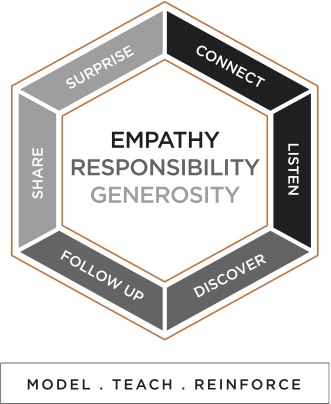Principles rule the world. Gravity is a principle that works on us whether we like it or not. Even if we choose not to believe in it and jump off a building, we’ll still fall. In the same way, principles apply to everybody, regardless of our background, our life experience, or our beliefs. Principles also rule our relationships with people. If we ignore or violate those principles, we will fail. The Three Core Loyalty Principles for earning loyalty in any relationship are:
- Empathy
- Responsibility
- Generosity

True loyalty is the natural consequence of principled behavior. Principled behavior awakens loyalty much more effectively than reward points or promotions. Through our research, we’ve found that customers and employees are loyal to organizations and people who show empathy for them, take responsibility for their work, and act generously. These are not just techniques—they are behaviors that can be learned and adopted by anyone in your organization. Here’s a preview of the Three Core Loyalty Principles and the practices that go with each one:
LOYALTY PRINCIPLE 1: EMPATHY
We earn the loyalty of our customers and coworkers when we have empathy for them—the power not only to hear what they are saying, but also to feel what they feel. We shift our thinking from apathy to empathy. To show empathy, we need to do these two things:
- Make a Genuine Human Connection. We earn loyalty when we connect with people in a warm, human, positive way. Authentic connections can transform a group of disengaged workers into a truly customer-centric team.
- Listen to Learn the Hidden Story. Listening to understand is the key to empathy. We earn loyalty from our customers and colleagues when listening to truly learn each other’s needs, concerns, and stories. We treat people differently when we know their stories, often hidden from view until others feel comfortable enough to share them with us.
LOYALTY PRINCIPLE 2: RESPONSIBILITY
We earn loyalty when we take ownership for what should be done. We don’t simply give people what they ask for; instead, we own the goals and outcome for our customers and colleagues. We actively teach others how to take responsibility themselves. To take responsibility, we need to do these two things:
- Discover the Real Job to Be Done. What people ask for may not be what they really need. A customer in a hardware store asks to buy a wrench. Unless we find out what job they want the wrench to do, we don’t know which wrench they need or if they need a wrench at all. To serve a customer or coworker responsibly, we need to ask thoughtful questions so we know what job they need us to do for them.
- Follow Up to Strengthen the Relationship. We make the relationship stronger by following up. It shows we care about the customer’s or coworker’s experience and want to learn from it to improve. Uncovering problems is an especially opportune time to demonstrate our commitment to making things right and exceeding expectations.
LOYALTY PRINCIPLE 3: GENEROSITY
We earn loyalty when we are generous with others. By giving from our heart and giving more than is necessary or expected, we transform customers and coworkers into advocates. We delight in finding ways to make other people’s lives easier and better. To be generous with other people, we need to do these two things:
- Share Insights Openly. We share ideas and information that help others learn and improve. When motivated by a spirit of genuine generosity, feedback is seen as a gift. Sharing our knowledge to help customers fix a problem can engender intense feelings of loyalty.
- Surprise with Unexpected Extras. We constantly experiment with new and creative ways to show people we care about them. We give “extras” that cost little—sending personal messages, remembering names, testing new surprises. Simple things like these can endear us to our customers and associates.
If you’re wondering whether empathy, responsibility, and generosity are really fundamental principles of loyalty, imagine doing the opposite. Imagine treating everyone apathetically, irresponsibly, and selfishly. It’s been done—in fact, it’s done all the time—but it’s not going to earn us loyalty. In fact, it drives customers and employees away. If we intentionally focus on living by these loyalty principles, we will earn loyalty as a matter of course. Loyal customers and colleagues will naturally gravitate to us.
What Happens When We Adopt a Loyalty Leader Mindset
Whether we have a formal leadership role or not, we become a loyalty leader when we adopt the Loyalty Leader Mindset and then model, teach, and reinforce the Three Core Loyalty Principles. If we’re in a customer-facing role, by doing a few simple things that turn 10 customers a day toward real loyalty, in a week we’ve created 70 new promoters! And if we manage 10 employees who, by doing a few simple things, turn 10 customers a day toward true loyalty, every day we create 100 new advocates! Creating new advocates every day establishes the foundation for becoming a loyalty leader.
We’ve worked with thousands of organizations globally, and here’s what we know: Creating customer and employee loyalty is an essential component to long-term success. Maybe it would surprise you to know that working hard to earn the loyalty of others can actually make you a happier and more fulfilled person, too. We challenge you to commit to live the principles of empathy, responsibility, and generosity in your own life, and to bring your team along for the ride. It doesn’t matter who you are—a CEO, a division manager, a team leader, or anyone who is customer facing—you serve the needs of other people, and you need their loyalty. It doesn’t matter where you go or whom you serve—imagine what would happen if you practiced these principles at home. The principles of loyalty are the same.
Model, Teach, Reinforce, and Hire For Loyalty
How do you instill these principles into a team? Earning loyalty is much more than teaching lessons in good service techniques. It’s far more than giving everyone a copy of “Customer Service for Dummies”and ordering the team to smile and say, “Have a nice day.” Your challenge is to model, teach, reinforce, and hire for the loyalty principles.
Modeling. You might be saying to yourself, “I am already empathic. I am responsible, and I am generous.” Or you may feel committed to developing these behaviors in yourself. As a result, you can be a model for the members of your team, and they benefit from that more than anything. Of course, none of us is as good at living by these principles as we could be, and few of us consciously focus on them deliberately, making them the foundation of our lives. So your first challenge is to do that—to become even more the empathic, responsible, generous person you can be. Most of us have a ways to go. But that shouldn’t discourage us. We can be more deeply good. We can listen better. We can make others feel more valued. And as we do so, we become the example, the model of what it takes to earn the loyalty of others.
Teaching. Most of us work as part of a team, so the second challenge is to build a team around us that also lives by these principles. If you are an individual team member, you can live by these principles and teach others by example. “I’m not a teacher,” you say? Yes, you are. You can’t help being a teacher: Your example influences the behavior of other people all day long. If you are a manager, you are, in fact, a teacher, whether you like it or not. Besides, there are real upsides to becoming a good teacher. For one thing, you’re the manager: The members of your team are going to pay attention when you teach because they know if you value these principles, they need to do the same. The biggest upside: When you teach a principle, you own it, you internalize it, you learn the most. The principle becomes part of you.
Reinforcing. The third challenge is to reinforce the loyalty principles—all the time. When you praise a team member for showing responsibility, that’s reinforcement. When you notice team members being less than empathic, you take them aside and gently remind them of the principle. When you see a generous act, you celebrate it with the team and say, “Now that’s what we want to see!” Here are reinforcement tips you can apply to every lesson in this book:
- Hold loyalty huddles regularly and often.
- Recognize team members who share and contribute to building loyalty. Try to catch them in the act and celebrate it. You’ll encourage others to do the same and create a culture where loyalty behaviors are celebrated continuously.
- Point to your customer- and employee-loyalty measures. Are they improving as your team members share insights and act on them? As you celebrate team members’ success in living the loyalty principles?
- Coach individuals in private on ideas for building loyalty with customers and coworkers.
Hiring. If you are in a position to hire, the loyalty principles ought to be your main criteria for bringing people onto the team. For example, Progressive Insurance changed its claims adjustor hiring profile from “cop/investigator” to “nurse.” Business researcher and author Jim Collins says the most important thing to look for in a new hire is “alignment with your core ideology and values.” In your case, this means hiring people who are empathic, responsible, and generous. You start out way ahead if they already live by these principles. When interviewing candidates, ask for examples from past experience where their actions exhibited each principle. For example, “Please tell me about a time when you showed empathy to a customer and the impact it had. Please tell me about when you took personal responsibility for a customer issue, and it earned that customer’s loyalty.”
Even if you have no control over hiring, remember that you still have control over the most important ingredient to earning loyalty: your own behavior and the example you set for your team.
Excerpt from “Leading Loyalty: Cracking the Code to Customer Devotion,” by Sandy Rogers, Leena Rinne, and Shawn Moon (HarperCollins Leadership, March 2019). For more information, visit: www.leadingloyaltybook.com.
Sandy Rogers is the leader of FranklinCovey’s Loyalty Practice. He was previously senior vice president at Enterprise Rent-A-Car. During his 14 years there, Rogers managed the turnaround of the London, England, operation and led the teams that developed Enterprise’s marketing strategy and system for improving customer service across all branches.
Leena Rinne is FranklinCovey’s vice president of consulting. She has been with FranklinCovey for more than 13 years and has worked with hundreds of organizations to develop great leaders and create organizational greatness. Rinne is also the coauthor of the Wall Street Journalbest-selling book, “The 5 Choices: The Path to Extraordinary Productivity.”
Shawn Moon, a nearly 30-year associate with FranklinCovey, has decades of experience in leadership and management, sales and marketing, program development, and consulting services. Moon is the author or coauthor of several books, including “The Ultimate Competitive Advantage”and “Talent Unleashed.”



